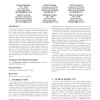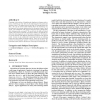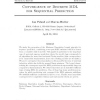876 search results - page 136 / 176 » On a theory of learning with similarity functions |
CORR
2011
Springer
13 years 2 months ago
2011
Springer
Modeling the behavior of imperfect agents from a small number of observations is a difficult, but important task. In the singleagent decision-theoretic setting, inverse optimal co...
ICPR
2006
IEEE
14 years 8 months ago
2006
IEEE
1 A kernel determines the inductive bias of a learning algorithm on a specific data set, and it is beneficial to design specific kernel for a given data set. In this work, we propo...
WWW
2009
ACM
14 years 8 months ago
2009
ACM
Giving suggestions to users of Web-based services is a common practice aimed at enhancing their navigation experience. Major Web Search Engines usually provide Suggestions under t...
KDD
2005
ACM
14 years 8 months ago
2005
ACM
Clustering is the problem of identifying the distribution of patterns and intrinsic correlations in large data sets by partitioning the data points into similarity classes. This p...
COLT
2004
Springer
14 years 1 months ago
2004
Springer
We study the properties of the Minimum Description Length principle for sequence prediction, considering a two-part MDL estimator which is chosen from a countable class of models....



